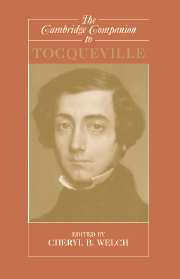Book contents
- Frontmatter
- Introduction: Tocqueville in the Twenty-First Century
- 1 Tocqueville’s Comparative Perspectives
- 2 Tocqueville on 1789: Preconditions, Precipitants, and Triggers
- 3 Tocqueville’s New Political Science
- 4 Tocqueville, Political Philosopher
- 5 Tocqueville’s Democracy in America Reconsidered
- 6 Translating Tocqueville: The Constraints of Classicism
- 7 The Writer Engagé: Tocqueville and Political Rhetoric
- 8 The Shifting Puzzles of Tocqueville’s The Old Regime and the Revolution
- 9 Tocqueville and Civil Society
- 10 Tocqueville on Threats to Liberty in Democracies
- 11 Tocqueville on Democratic Religious Experience
- 12 Tocqueville on Fraternity and Fratricide
- 13 Tocqueville and the French
- 14 Tocqueville and the Americans: Democracy in America as Read in Nineteenth-Century America
- Bibliography
- Index
- Series List
4 - Tocqueville, Political Philosopher
Published online by Cambridge University Press: 28 January 2007
- Frontmatter
- Introduction: Tocqueville in the Twenty-First Century
- 1 Tocqueville’s Comparative Perspectives
- 2 Tocqueville on 1789: Preconditions, Precipitants, and Triggers
- 3 Tocqueville’s New Political Science
- 4 Tocqueville, Political Philosopher
- 5 Tocqueville’s Democracy in America Reconsidered
- 6 Translating Tocqueville: The Constraints of Classicism
- 7 The Writer Engagé: Tocqueville and Political Rhetoric
- 8 The Shifting Puzzles of Tocqueville’s The Old Regime and the Revolution
- 9 Tocqueville and Civil Society
- 10 Tocqueville on Threats to Liberty in Democracies
- 11 Tocqueville on Democratic Religious Experience
- 12 Tocqueville on Fraternity and Fratricide
- 13 Tocqueville and the French
- 14 Tocqueville and the Americans: Democracy in America as Read in Nineteenth-Century America
- Bibliography
- Index
- Series List
Summary
Since 2002, texts by Tocqueville have been included in the syllabus for the French Agrégation de Philosophie. What are we to think of this belated promotion of Tocqueville to the rank of philosopher? Did the sages who draft the syllabi give in to the winds of fashion? Or did their selection finally reveal the true nature of the ''Norman aristocrat?'' I shall try to answer this question.
A TOTALLY NEW WORLD
We see Alexis de Tocqueville first of all as a citizen, a politician, and statesman confronting a temporal discontinuity. The old order has been swept away; the new order is not firmly established. If instability and disorder are prevalent in institutions, it is because they already affect men’s souls: “The laws of moral analogy have . . . been abolished.” If one is to become capable of acting in and on the new society, one must first know it. But what does it mean “to know the new society?” A “new political science” of unparalleled prestige already existed, that of Montesquieu. Benjamin Constant held fast to Montesquieu’s conclusion that the “modern difference” was the difference introduced by the development of commerce and the institution of regular political representation. In a style all his own, François Guizot ratified and extended the science of “representative government.”
- Type
- Chapter
- Information
- The Cambridge Companion to Tocqueville , pp. 108 - 120Publisher: Cambridge University PressPrint publication year: 2006
- 8
- Cited by



